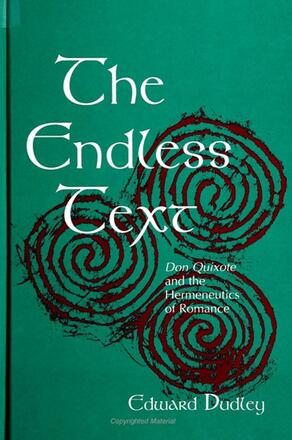
The Endless Text
Don Quixote and the Hermeneutics of Romance
Alternative formats available from:
Traces the history of chivalric fiction in Western Europe, from the earliest Celtic tales to the conflict between romance and realism in Don Quixote.
Description
CHOICE 1998 Outstanding Academic Books
The Endless Text is the first study to trace the history of chivalric fiction in Western Europe, from the earliest Celtic tales to the conflict between romance and realism in Don Quixote. A set of specific rhetorical devices are traced through the development of medieval romance in the works of Chretien de Troyes, and a surprising number of these devices survive in Don Quixote: the troubled relationship between narrator and hero, the consistent image of the hero in contrast to the fluctuating portrayals of women, and the ways in which problems of retelling the story become part of the story itself.
An integral part of this rhetorical migration was the unstable referential value of the lexicon: for example, fish platters became holy chalices, and gods became heroes while goddesses and Otherworld women became evil enchantresses. It was this linguistic revolution that created the "hermeneutics of romance" and forced readers to interpret the unstable signs embedded in the text. Fear of how this played out in the reader's consciousness was the basis for the condemnation of romance by church and state. Ultimately, this critical approach provides a new formula for rereading Don Quixote, one that reinterprets the questions of what makes or unmakes a hero, what is free will in relation to destiny, and how the language of women differs from that of men.
Edward Dudley is Professor of Spanish and Comparative Literature at State University of New York at Buffalo. He has coedited El Cuento; The Wild Man Within: An Image in Western Thought from the Renaissance to Romanticism; and American Attitudes Toward Foreign Languages and Foreign Cultures.
Reviews
"Don Quixote establishes in this book a dialogue with its own proto-history, namely, romance. What makes this study extraordinary is how its conclusions about the relations between romance and feminism, male canon formation, and others, definitely project the text, in a decisive way, toward the present and the future and less toward tradition. This uncovering of many elements from the past is elaborated as truly relevant to our postmodern condition, and presented as a challenge to traditional logocentrism and, in that sense, it is a true critical tour de force.
"I like both the originality and the readability of this book, the development of a new hermeneutic and the resulting new reading of a classic text. I would not be surprised if, as a result of the publication of this book, specialists begin talking of a new kind of identifiable interpretive stand, similar to the 'Castro reading' or the 'El Saffar reading'--a 'Dudley reading' of Don Quixote." -- Francisco LaRubia-Prado, Georgetown University